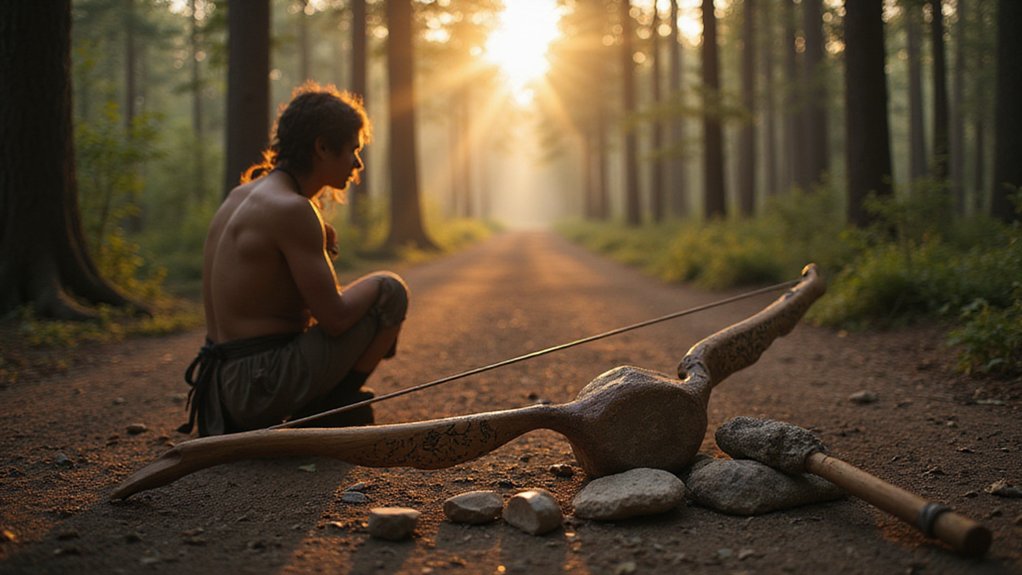When you think about primitive hunting methods, what comes to mind? These techniques have shaped human survival for millennia, using tools and strategies that might seem simple yet are profound in their effectiveness. Understanding how ancient cultures developed these methods reveals much about our connection to nature. But why should these age-old practices matter to you today? The answer might surprise you as we explore their relevance and application in modern life.
What Are Primitive Hunting Methods?
Primitive hunting methods refer to the techniques and tools used by early humans to capture animals for food. These methods include using simple weapons like spears, bows, and traps, relying on stealth and teamwork.
You might think of how early hunters employed their surroundings, using camouflage and natural cover to approach their prey. They often tracked animal movements, understanding their habits and habitats to increase success.
Gathering in groups, they developed coordinated strategies, enhancing their chances of a successful hunt. These methods laid the groundwork for later hunting practices, showcasing human ingenuity and adaptability in the quest for sustenance.
How Did Ancient Cultures Develop Primitive Hunting Methods?
As early humans faced the challenges of survival, they developed hunting methods that reflected their environment and social structures. You’d notice that these methods evolved based on available resources, climate, and the types of animals they pursued.
Collaboration was key; groups worked together, sharing knowledge and skills, which led to more sophisticated techniques. Observation of animal behavior helped you understand patterns, improving your chances of success.
Over generations, these methods were refined, passed down through storytelling and practice, ensuring each culture adapted uniquely to their surroundings. This adaptability was essential for survival, shaping the foundation of primitive hunting methods we study today.
What Tools and Techniques Are Used in Primitive Hunting?
Ancient cultures relied on a variety of tools and techniques to enhance their hunting success. You’d find stone-tipped spears and arrows, crafted for precision and lethality.
Traps and snares were set to catch unsuspecting prey, while nets helped in group hunts. Fire played an essential role, used for driving animals or cooking meat.
Camouflage techniques, like natural dyes and materials, assisted in stealth. Additionally, tracking skills, honed through observation, enabled hunters to follow animal trails effectively.
Each tool and technique was significant, reflecting the ingenuity and adaptability of early humans in their quest for sustenance in the wild.
Why Are Primitive Hunting Methods Still Relevant Today?
While modern technology has transformed hunting practices, the relevance of traditional methods remains significant. These techniques foster a deep connection to nature, teaching you survival skills that can be invaluable in emergencies.
Primitive hunting methods encourage mindfulness and patience, helping you appreciate the hunt beyond mere sport. They also promote sustainable practices, emphasizing respect for wildlife and ecosystems.
Plus, mastering these skills can be a rewarding challenge, enhancing your overall hunting experience. Whether you’re seeking adventure or a deeper understanding of your environment, embracing primitive methods opens doors to a richer, more fulfilling outdoor journey.
How Can You Learn and Practice Primitive Hunting Methods?
How can you plunge into the world of primitive hunting methods? Start by researching techniques like tracking, trapping, and bow-making through books and online resources.
Join workshops or classes led by experienced practitioners to gain hands-on experience. Practice your skills in a safe environment, like your backyard or local woods, focusing on stealth and patience.
Connect with local hunting communities to share knowledge and tips. Experiment with different tools and materials, and don’t be afraid to make mistakes; they’re part of the learning process.
Most importantly, immerse yourself in nature to truly understand the rhythms of wildlife.
What Are the Ethical Considerations in Primitive Hunting?
Understanding the ethical considerations in primitive hunting is essential for anyone looking to engage in this practice responsibly.
You must respect wildlife and their habitats, ensuring that your actions don’t endanger species or ecosystems. Sustainable hunting practices, like limiting your take and using every part of the animal, are vital.
Additionally, consider the cultural significance of hunting in various communities; it’s important to honor those traditions. Educate yourself on local laws and regulations, and always prioritize safety and respect for the environment.
How Do Primitive Hunting Methods Compare to Modern Techniques?
Engaging in ethical hunting practices sets a foundation for comparing primitive methods with modern techniques.
While both aim to harvest game sustainably, their approaches differ greatly. You’ll notice key distinctions:
- Tools: Primitive hunters rely on handmade weapons, while modern hunters use advanced technology like rifles and scopes, enhancing accuracy and efficiency.
- Skills: Primitive methods require deep knowledge of animal behavior and tracking, contrasting with the reliance on gadgets in modern practices.
- Connection: Primitive hunting fosters a profound relationship with nature, whereas modern techniques can sometimes detach you from the natural world.
Understanding these differences enriches your hunting experience and respect for the environment.
What Role Do Primitive Hunting Methods Play in Survival Skills Training?
While you mightn’t think of primitive hunting methods in the context of survival skills training, they play an essential role in developing self-sufficiency and resilience.
By practicing these techniques, you learn to adapt to your environment and utilize available resources. Skills like tracking, trapping, and crafting tools foster a deeper connection with nature, enhancing your awareness and problem-solving abilities.
Additionally, these methods teach patience and perseverance—key traits for any survival situation. Engaging in primitive hunting not only equips you with practical skills but also instills confidence, empowering you to face challenges with creativity and resourcefulness.
